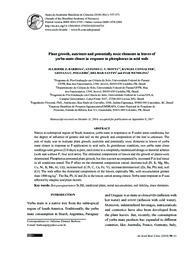Plant growth, nutrients and potentially toxic elements in leaves of yerba mate clones in response to phosphorus in acid soils.
Plant growth, nutrients and potentially toxic elements in leaves of yerba mate clones in response to phosphorus in acid soils.
Author(s): BARBOSA, J. Z.; MOTTA, A. C. V.; CONSALTER, R.; POGGERE, G. C.; SANTIN, D.; WENDLING, I.
Summary: Native to subtropical region of South America, yerba mate is responsive to P under some conditions, but the degree of influence of genetic and soil on the growth and composition of the leaf is unknown. The aim of study was to evaluate plant growth, nutrients and potentially toxic elements in leaves of yerba mate clones in response to P application in acid soils. In greenhouse condition, two yerba mate clone seedlings were grown (210 days) in pots, each clone in a completely randomized design in factorial scheme (with and without P; four acid soils). The elemental composition of leaves and the growth of plants were determined. Phosphorus promoted plant growth, but this was not accompanied by increased P in leaf tissue in all conditions tested. The P effect on the elemental composition varied: decrease/null (N, K, Mg, Mn, Cu, Ni, B, Mo, Al, Cd); increase/null (C/N, C, Ca, Fe, V); increase/decrease/null (Zn, Ba, Pb) and; null (Cr). The soils affect the elemental composition of the leaves, especially Mn, with accumulation greater than 1000 mg kg-1. The Ba, Pb, Al and Zn in the leaves varied among clones. Yerba mate response to P was affected by edaphic and plant factors.
Publication year: 2018
Types of publication: Journal article
Unit: Embrapa Forestry
Observation
Some of Embrapa's publications are published as ePub files. To read them, use or download one of the following free software options to your computer or mobile device. Android: Google Play Books; IOS: iBooks; Windows and Linux: Calibre.
Access other publications
Access the Agricultural Research Database (BDPA) to consult Embrapa's full library collection and records.
Visit Embrapa Bookstore to purchase books and other publications sold by Embrapa.

